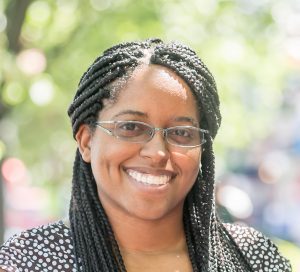OXFORD —A new faculty member will join the University of Mississippi School of Law beginning Fall 2020.
 Yvette Butler, an attorney who specializes in law related to sex work and human trafficking, sexual violence and civil rights, will join UM Law as an assistant professor. Butler will teach civil and political rights, critical race theory and sexuality and law.
Yvette Butler, an attorney who specializes in law related to sex work and human trafficking, sexual violence and civil rights, will join UM Law as an assistant professor. Butler will teach civil and political rights, critical race theory and sexuality and law.
“We are so excited to welcome Yvette to the UM Law family,” said Susan Duncan, UM Law Dean. “Her passion for human rights and justice combined with her extensive experience will make her an asset to our institution and a wonderful example for our students.”
Butler earned her J.D. from George Washington University Law School in 2014 and her B.A. in philosophy from the University of Minnesota, Morris in 2011. She joins UM from the Center for Survivor Agency and Justice in Washington, D.C.
“Ole Miss is the whole package,” Butler said. “I’m beyond excited about the courses I’ll teach. The faculty, staff, and students I’ve met are welcoming, engaging, and have a great sense of humor, and the administration also seems truly supportive of intellectual freedom.
“I’m really looking forward to engaging with folks across departments on research, teaching, and other creative endeavors.”
At the Center for Survivor Agency and Justice, she served as director of capacity building and systems change to address issues of economic security for survivors of domestic and sexual violence.
Additionally, she served as a policy director for the Amara Legal Center to lead legislative and policy changes in civil rights and criminal justice reform and as a law clerk for the U.S. District Court of South Dakota where she assisted a federal magistrate judge with criminal and civil rights cases.
She has also delivered numerous presentations and published several articles on human trafficking, criminalization and civil rights.
Butler’s interest in advocating for others is more than just a passion found in practice. It’s part of her identity.
“My paternal grandparents focused on racial equity and human rights. My maternal grandparents, from Trinidad and Tobago, were deeply involved in labor rights on the island and in Canada,” Butler said. “I’ve been raised to think about others and the positive impact I can leave on the world. Also, I think it’s hard to grow up black – or indigenous or another minority status – in America and not be at least somewhat interested in human rights and race relations.”
Butler said her work with trafficking survivors and representation of sex workers has taken many forms, including: victim witness advocate in criminal cases, divorce lawyer, policy advocacy around pre-arrest diversion, legislative advocacy to remove the ways we continue to criminalize victims of trafficking, civil rights cases related to profiling or improper searches of individuals accused of engaging in prostitution.
“Many of those opportunities allowed me to begin exploring the more complex reasons behind a variety of societal problems,” she said.
She plans to continue her research of those societal problems at UM, while also bringing her knowledge to students in a practical way.
“I hope to bring inspiring stories and nuggets of wisdom from practice,” Butler said. “Students are there to learn how to be a good lawyer, so I hope I can challenge them in the classroom and inspire them to look at the world in a different way.
“But also, law school and practice are tough,” Butler said. “I also plan to bring lessons on self-care and self-acceptance.”

